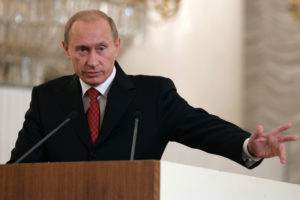[dropcap]O[/dropcap]ne of the most surprising past contributors to World War II magazine is a man of current notoriety: Russian President Vladimir Putin.
For nearly eight years—since April/May 2009—the magazine has been running a short feature called “Reading List,” which gives readers a glimpse of the bookshelves of eminent individuals with a passion for World War II. It’s a revealing mix, ranging from former secretary of state Madeline Albright, whose family fled Nazi-occupied Czechoslovakia in 1938, to rock musician Lemmy, late bassist of Motörhead and an avid collector of Nazi memorabilia. Vladimir Putin contributed a list to the March/April 2011 issue.
Looking to solicit contributions from world leaders, the magazine’s staff contacted the Russian Embassy to ask Putin, then Russia’s prime minister, to contribute. He obliged with a list in Russian and a set of requirements. He demanded that the list run uncut and unedited and insisted upon approval of our English translation. His list—which includes praise for a World War II article about truckers who crossed frozen Lake Ladoga to deliver food to the besieged citizens of Leningrad, Putin’s birthplace (now Saint Petersburg)—appears below.
The magazine’s final “Reading List” is in its January/February 2017 issue. Look for a replacement coming soon. To subscribe to World War II, click here:
 Dear Friends,
Dear Friends,
I am glad to describe some of the books about World War II that are especially meaningful to me—all the more so since I learned about the great research and educational work that World War II is doing.
I would like to thank the authors and the editorial board of the publication for the serious and thoughtful approach to one of the most difficult pages in the history of civilization. I was deeply touched by the article “Russia’s Ice Road Truckers” (November/December 2010), dedicated to Leningrad of the blockade period and the immortal feats of the inhabitants of that heroic city. In general, I would like to note the serious, objective, and professional approach that characterizes World War II.
Practically every family in Russia had its own casualties in that war. Both the pride in the victory and the pain of the losses are passed from generation to generation. And I think you will understand why we perceive any falsifications, any distortions of the history of World War II, any betrayal of the memory of the victory over Nazism as a personal insult, a sacrilege. For us it is very important that the majority of people all over the world share this principled position— that the voice of scholars and journalists, considering their professional and moral duty, sound loudly to tell the truth about World War II, its sources and lessons, and about the priceless experience of alliance. About the true heroes, in the face of which time does not really matter. And about the criminals who are not subject to rehabilitation.
Russian experts and historians are now very productively collaborating with colleagues from Germany, Poland, and other European countries. The veil of secrecy is being lifted from archival collections, and documents are finally being published. Roundtables and joint seminars are being held on World War II and on the seminal, dramatic, and sometimes debatable and not completely unambiguous events of the 1930s and 1940s. We support such a scholarly, non-politicized dialogue, and assume that American specialists will join in such efforts.
The memory of World War II, it’s terrible images, and it’s tragic times will always be imprinted in the reminiscences of its eyewitnesses—in their letters, stories, and memoirs. Turning to them gives us much to ponder. And, of course, the creative work of writers who served on the front lines—for example, nobody wrote about the history of World War I or about broken destinies more sincerely or truthfully than Hemingway or Remarque.
Russia is by rights proud of its entire constellation of outstanding writers and poets who were at the front and saw death face to face. I would recommend that you read their honest books, as they are devoid of falsification and pathos.
Learn about the heroes in the stories and novels of our war correspondents Konstantin Simonov (The Living and the Dead, 1959) or Mikhail Sholokhov (The Fate of a Man, 1957; They Fought for Their Country, 1959). Learn about the self-affirmation and great patience of the ordinary Soviet soldier, who became the theme of the works of officers Boris Vasil’ev (And the Dawns Here Are Quiet, 1969; He Was Not on the List, 1974) and Konstantin Vorob’ev (Killed Near Moscow, 1963; It is We, God! 1943). The book Moment of Truth (1973) by Vladimir Bogomolov, who went as a volunteer to the front, will tell you about the difficult days of military intelligence, filled with danger.
Let me add that these and many other works of our writers who served at the front have been translated into foreign languages. They have been adapted for the screen and some have become classics.
To conclude, I would like to wish the editors and readers of World War II all the best. Let us together protect and vindicate the truth.





